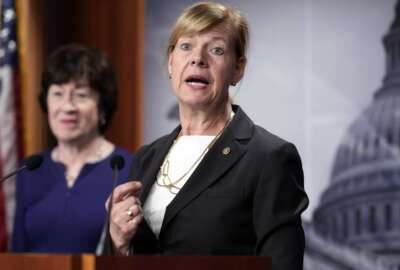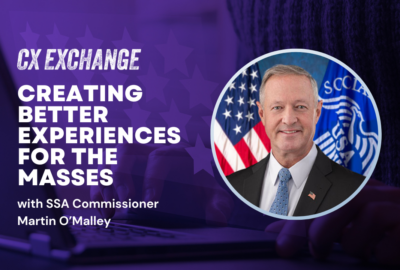Hubbard Radio Washington DC, LLC. All rights reserved. This website is not intended for users located within the European Economic Area.
Analysis: Cobert must avoid second term pitfalls
Experts say Beth Cobert must take the Goldilocks approach to developing management priorities for the next three years. President Barack Obama nominated Cobert ...
wfedstaff | April 17, 2015 5:30 pm
As the nominee to be the next management guru at the Office of Management and Budget, Beth Cobert will face apathy in the agencies, a hostile half of Congress and all the other challenges that come with a second term.
So to make progress on the revised management agenda, experts say Cobert, and the administration at large, must take the Goldilocks approach to priorities — focus on those that aren’t too hard, aren’t too soft, but those that are just right.
President Barack Obama nominated Cobert to be OMB’s deputy director for management Wednesday, more than four months after Jeff Zients resigned. 
Little is known about Cobert inside the federal community. Management experts do not know her, and her resume doesn’t make her work in the public sector obvious.
She has been a consultant at McKinsey & Company for about 30 years, working in an assortment of jobs, including her last role where she developed the skills for the more than 9,000 employees in the consulting practice, led the marketing and sales practice, and was the chairwoman of McKinsey’s pension fund.
OMB Director Sylvia Burwell said in an emailed statement that Cobert “has led major projects to generate performance improvements through process streamlining, enhanced customer service, improved deployment of technology, more effective marketing programs and strengthened organizational effectiveness. Within McKinsey, Beth has been a champion for people development and initiatives to support women’s advancement to leadership positions.”
Timing is everything
Experts say Cobert’s nomination comes at a key time for the administration. The president announced plans for a revised second term management agenda in July. But OMB has offered few details of what that will include.
Robert Tobias, director of the Key Executive Programs at the American University in Washington, said having steady leadership around the management agenda is even more important now than ever.
“I’m hopeful that the person selected is going to be able to get confirmed quickly. My suspicion is she will be non-controversial and she’ll get confirmed quickly and she can really get moving,” Tobias said. “Second term administrations start to lose momentum and there’s a chance people stop paying attention. The only way to overcome that is with a great deal of energy and a great deal of focus, and that can only happen if someone is in the job for a period of time.”
Tobias says OMB also needs to name someone to be the associate director of performance and personnel. That’s the job Shelley Metzenbaum held for more than four years before leaving in May.
The associate director’s job is the operational arm of the much of the management agenda and works with agencies on meeting management goals and requirements.
Building, sustaining momentum
Experts say as the Obama administration finalizes plans for the second term management agenda, which Cobert will lead, officials should keep in mind several challenges that derailed or slowed previous second-term priorities.
Former federal performance management officials say the first goal should be setting practical goals, and not try to overreach.
Robert Shea, a principal at Grant Thornton and former OMB official during the George W. Bush administration, said during the planning for the second term President’s Management Agenda he was reminded by a career civil servant of the difference between a first term priority and a second term priority.
“To start brand new ambitions in the second term, you’re just not as likely to get as much done, so you’ve got to be really focused on what it is you want to achieve in the limited amount of time you have left,” he said. “You know also that if there is opposition to what your objectives are, people can slow roll you, knowing you will be gone in a matter of years. The other challenge you have is that those initiatives that have taken hold and are showing some success will have their own set of issues. Keeping people focused on those, increasingly challenged to achieve even more, again, that will be a big issue.”
But Shea is quick to point out that while time may be tight — maybe two years at best — OMB and agencies have important tools to help push the agenda forward.
He said the President’s Management Council, and even the president himself, has the power to focus and energize priorities.
But it can’t be a top down approach either.
Tim Young, a principal with Deloitte Consulting and former deputy administrator in the Office of E-Government and IT at OMB under the Bush administration, said one of the biggest lessons learned is to get the career senior executives involved and motivated at the beginning of the effort.
Career staff must buy-in to initiatives
But Young said OMB also can’t overlook the importance of winning over the career staff more broadly.
“We recognized there are three groups to agency stakeholders when it comes to management reform. The first group is the champions, the leaders, the early adopters. These are the people who embrace what you are trying to do very passionately and go after it. They are usually in the minority relative to all other stakeholders,” he said. “The second group is the ambivalent managers. These are people who may like the concept, but want to wait and see if they want to be successful before they embrace it because they want to be associated with something successful and not failure. The last group is a key group, the cynics or stalwarts for status quo. These are individuals who may not want to embrace change because they’re not used to it, they don’t like it. Most people don’t like change anyway. These are the people who are very vocal about their resistance to doing something new, or better.”
Young said any administration shouldn’t focus on the cynics because they will not change their minds, and spend all of their time working with the first two groups.
“If you can get the first two groups to embrace your change, then you have a majority and you’ve got momentum, and then you can marginalize the last group,” he said.
OMB also has to ensure there are real measures and metrics, and transparency around what they are trying to accomplish. Young said having agreed upon measures takes the emotion out of the initiatives — did the agency either meet the goals or not?
Experts also warned against just blindly adding more and more priorities to agencies’ already over-filled plates.
Young called this the piling-on effect, where officials just want to add more and more without giving thought to what’s already expected of the workforce.
Filling the gaps left by sequestration
Tobias said Cobert and OMB need to address some of the personnel problems created by sequestration to handle the second term initiatives.
“I’m hopeful the Obama administration will start paying attention to the fallout from the sequester. Agencies have been eliminating training, eliminating leadership development programs,” Tobias said. “It’s very hard to have people actually maximize the contributions of those they lead when they don’t have the skills to do that. I’m hopeful the administration will really focus on providing people with the leadership competencies they need to be successful in this downsized government we have now.”
Metzenbaum, the former OMB performance guru, said by email that Cobert “will face the daunting challenge of helping agencies stay focused on achieving better outcomes and better service, amidst seemingly unending demands for quick responses, occasional crises, and, of course, the persistent budget issues.”
But she said there are opportunities too.
Cobert will be able “to build on a strong results-focused foundation established in the first term where an increasing number of people in federal agencies have begun to appreciate the value of setting priorities, focusing on outcomes, assigning responsibility for leadership on specific goals, and using frequent goal-focused, data-driven reviews to find smarter ways to make progress on priorities.”
Young said Cobert, and the administration more broadly, need to understand the difference between urgent and important priorities because the payoff for many of these initiatives are years away and will come after the political appointees have left office.
“In order for a reform agenda to be successfully implemented, it can’t be political in nature. It can’t be something that is left of center or right of center in terms of the nature of the reform. It has to be a good government initiative,” he said. “If it’s not a good government initiative and it’s politically charged, then the people that are almost entirely responsible for overseeing the implementation of it, which are the career civil servants, will have tissue rejection, for lack of a better phrase, on the agenda. It needs to be in their best interest for it to have a sticking effect in terms of being implemented over a four, or potentially eight-year time frame.”
Grant Thornton’s Shea added having so many new deputy secretaries and assistant secretaries for management coming in at once also will impact how quickly the agenda takes hold.
He and Tobias both say it’s going to be interesting to watch Cobert’s confirmation hearing as well as how the Obama administration builds on the work they did over the last four plus years in driving performance and innovation.
“Folks will be assessing the extent to which she’s got experience addressing the kinds of issues that the government’s facing, but in large organizations. What’s her capacity to deal with financial management, major IT challenges and human capital?” Shea said. “Also, to what extent does she think being transparent about her performance will help her do her job and working with the Congress to set mutually agreeable goals and report regularly on progress. That would be something you’d want to hear a commitment on. But this is fresh face for the federal management community, and what new ideas are there to confront some of these intractable problems we face year after year?”
RELATED STORIES:
Obama nominates McKinsey consultant for DDM role
OMB defines next steps for refreshed management agenda
More progress needed on Obama’s performance management agenda
Major changes to performance management in OMB budget guidance
Copyright © 2024 Federal News Network. All rights reserved. This website is not intended for users located within the European Economic Area.
Jason Miller
Jason Miller is executive editor of Federal News Network and directs news coverage on the people, policy and programs of the federal government.
Follow @jmillerWFED
First Look
IT Modernization
Read more





